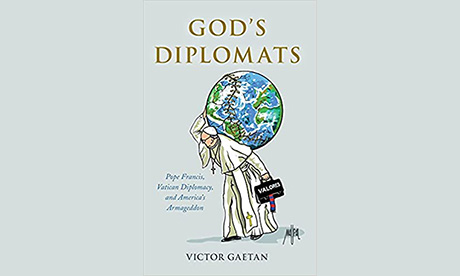Vatican diplomacy has diverged sharply from U.S. foreign policy under Pope Francis, according to a new book, which details examples to illustrate the widening divide.
“While Francis has continued the pragmatism of his two predecessors, he’s also a skilled administrator, who’s mobilized the whole diplomatic corps with its interlocking assets to implement a culture of encounter,” said author Victor Gaetan.
“The Holy Father’s accomplishments deserve to be appreciated, especially when so much random, unjust criticism is deployed against him.”
“God’s Diplomats: Pope Francis, Vatican Diplomacy and America’s Armageddon,” published July 15 by Rowman and Littlefield, uses inside sources, maps and field reporting to reveal the high-stakes world of international diplomacy, supplemented by Gaetan’s access to the Vatican Secret Archives.
It maintains the pope’s diplomacy has worked better than the “militarized approach” of recent U.S. policy and demonstrates advances achieved by the Vatican as a mediator and reconciler, even with countries once considered hostile.
The Holy See under Pope Francis no longer has a Western European outlook
Gaetan has served as an international correspondent for Catholic News Service and the National Catholic Register, writing from Europe, Asia, the Middle East and Latin America, and has also contributed to Foreign Affairs and the Catholic magazine America.
Among other degrees, he has a master of arts in law and diplomacy at The Fletcher School, Tufts University, Medford, Massachusetts.
In a July 28 interview with CNS, Gaetan said he had personally benefited from Vatican diplomacy as a child in Romania, when negotiations with the communist regime led to the reopening of churches.
He added that veteran U.S. officials viewed Rome’s “Ostpolitik” toward Eastern Europe as “the jewel of Vatican diplomacy” and said many foreign policy shapers had praised the “professionalism and deep knowledge” of Vatican diplomats.
“I hope this book will encourage greater appreciation of the excellence and relevance of Vatican diplomatic practice,” Gaetan told CNS.
As examples of divergent Vatican-U.S. approaches, growing since St. John Paul II’s “deep opposition” to the 2003 invasion of Iraq, the book cites the Vatican’s refusal to demonize Russia, cultivating it instead as a “valued Christian ally,” and encouragement of Christian leaders in Syria who rallied around President Bashar Assad.
Like previous pontiffs, Pope Francis has maintained strong ties with Shiite leaders in Iran, Iraq and Lebanon, the book says, while his engagement with Sunni leaders in Egypt, Saudi Arabia and elsewhere led to a historic February 2019 peace declaration with Sheikh Ahmad el-Tayeb, grand imam of al-Azhar University.
Informative, insightful and entertaining, he has produced a page-turner that will shed much light and offer fresh perspective on parts of Pope Francis’ ministry that have received too little attention. . . .If you read one book on Pope Francis and the Vatican this year, read this one!
In South Sudan, the pope backed a unity government and opposed Washington’s “pointless sanctions.”
He also supported an Israeli-Palestinian “two-state solution,” signing the Vatican’s first bilateral accord with Palestine and opposing President Donald Trump’s controversial peace plan and the U.S. Embassy’s move to Jerusalem.
In Colombia, Pope Francis sought to end “five decades of devastating killings, destruction and narco-trafficking” by bringing opposing leaders together, the book points out.
Pope Francis defied harsh U.S. criticisms with a renewed 2020 Vatican agreement with China, recognizing a joint process for selecting bishops while giving the pope the final say.
He added that Pope Francis, who has visited 52 countries since his March 2013 election, wielded power as a “moral authority,” but also exercised “broad and deep control” over the Vatican’s diplomatic apparatus.
“The Holy See under Pope Francis no longer has a Western European outlook,” Gaetan said. Continue reading
